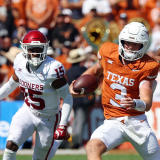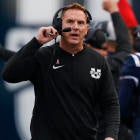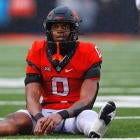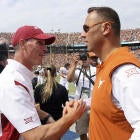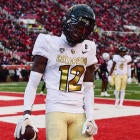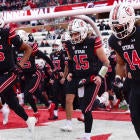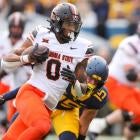
Game boycotts by players are among the options being considered by the new College Athlete Advocacy Initiative, which formally launched Monday. The New York-based organization plans to offer a wide variety of legal and advisory benefits to college athletes looking to advocate and achieve college athletic reforms.
According to the organization's press release, assistance will be provided to families and athletes for issues related to "financial aid cancellations, transfer penalties, harmful recruiting practices, health and safety concerns and abuse and mistreatment."
The organization plans to develop "a strategic advocacy campaign, including athlete-led demonstrations, to raise awareness of critical issues."
"Demonstrations can be anything from wearing particular socks or wrist bands to taking a knee to raising a fist all the way to boycotting a game," said Tim Nevius, CAAI founder and executive director.
The group's logo is, in fact, a raised fist.
"It kind of sends that message right away that this takes somewhat of an aggressive stance and pushing for change," said Nevius, a former NCAA investigator and New York-based attorney.
Student-athlete welfare has been an overriding mission in NCAA legislation this decade. At the same time, some athletes and reformers believe it hasn't been enough.
Numerous lawsuits challenging NCAA authority have been common this decade. Northwestern players sought to unionize in 2015. That same year, the Missouri football team threatened to boycott citing racism concerns on campus.
Transfer reforms last year led to players being able to leave teams and seek opportunity elsewhere without permission from their school or coach. The transfer portal has been one of the more profound changes in NCAA history.
However, there are still concerns about coaches and schools being able to block players from transferring in non-revenue sports.
CAAI advisors include former Wisconsin forward Nigel Hayes, an outspoken NCAA reformer, as well as former UCF kicker Donald De La Haye.
The CAAI is partnering with the Urban Justice Center of New York, a social justice advocacy group. The plan is for the two entities to provide pro bono legal work for college athletes.
"What I've noticed is, through my practice this past year, we developed a fairly large network of athletes who are upset about their experience in the system," Nevius said. "We're tapping into that network, too."
College sports has endured protests at the periphery but seldom from a an outside group considering options as drastic as a boycott.
Former shoe marketer Sonny Vaccaro told CBS Sports in 2013 that two basketball teams had considered such a boycott in the early 1990s to delay the start of a game by 10 minutes to bring attention to players' rights.
"Two specific teams had talked about something like that; one team was pretty far down to the line. ... A player or players would have delayed a major, major game that the world was hooked to," Vaccaro said then. "Then everybody would have panicked. ... They had the power in their hands."
During the early 1990s, Vaccaro was with Nike, which was closely affiliated with Michigan, UNLV and Georgetown. At least one of those schools played in the Final Four every year but two from 1984-93.
Similar players' rights groups have been launched this decade. They include All Players United and the College Athletes Players Association.


